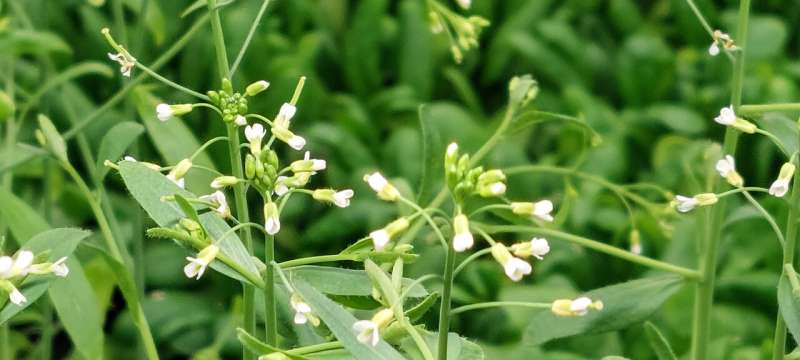Proteins control light-induced seed germination in Arabidopsis thaliana

The seeds of a plant are relatively well protected against harmful environmental influences, while a seedling is very vulnerable. Therefore, plants in the early stage of development must closely control their seed germination: In time windows with good conditions they germinate very quickly, while in unfavorable conditions they effectively suppress seed germination. Incident light, which the plants perceive through a group of photoreceptors called phytochromes, plays a central role in this process. A team led by Prof. Dr. Andreas Hiltbrunner, a member of the Cluster of Excellence CIBSS—Center for Integrative Biological Signaling Studies, at the Institute of Biology II at the University of Freiburg has used Arabidopsis to investigate the molecular mechanism by which phytochromes control light-dependent seed germination. According to the results of the Freiburg researchers, the proteins ERF55 and ERF58 suppress the germination of the plant. The biologists recently published their work in the journal Nature Communications.
Proteins ERF55 and ERF58 interact with the phytochromes
Seed germination is a crucial step in the life cycle of plants, controlled by the phytohormones abscisic acid and gibberellin, as well as phytochromes—the photoreceptors in plants that sense red light. "In our work, we show that the proteins ERF55 and ERF58 interact with phytochromes to allow or prevent seed germination, depending on light conditions," Hiltbrunner explains.
The researchers kept Arabidopsis seeds for three days in constant darkness and then irradiated them with different light conditions. The biologists were able to show that the phytochromes in Arabidopsis bind the two proteins ERF55 and ERF58, thereby preventing their activity when the conditions in the environment are favorable for germination. "In line with this, seeds from plants lacking ERF55 and ERF58 germinate better than seeds with ERF55 and ERF58," Hiltbrunner says. ERF55 and ERF58 control seed germination by affecting the levels of the phytohormones abscisic acid and gibberellin. "Abscisic acid prevents seed germination and we have seen that seeds without ERF55 and ERF58 have less abscisic acid and therefore germinate better. This allows us to show for the first time that ERF55 and ERF58 proteins play a critical role in phytochrome-mediated regulation of the germination process."
More information: Zenglin Li et al, The phytochrome interacting proteins ERF55 and ERF58 repress light-induced seed germination in Arabidopsis thaliana, Nature Communications (2022). DOI: 10.1038/s41467-022-29315-3
Journal information: Nature Communications
Provided by University of Freiburg
















